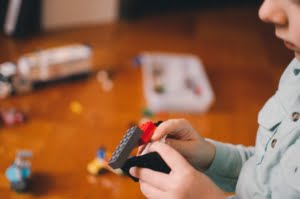Many parents have traditionally believed that children do not have stress or problems. People will say that children have no worries or that they have “too good of a life” to be dealing with mental illness or other issues. Some adults will even minimize their kids’ problems because the adult’s problems are “worse.” For support, San Diego Christian Counseling is here to help.
 The reality is, however, that children often experience stress, anxiety, depression, grief, suicidal ideation, and other issues. It is a disservice to them to ignore or minimize. Often children will not tell their parents about these issues for several reasons. They may not feel heard or understood.
The reality is, however, that children often experience stress, anxiety, depression, grief, suicidal ideation, and other issues. It is a disservice to them to ignore or minimize. Often children will not tell their parents about these issues for several reasons. They may not feel heard or understood.
They may think that their problems are not worth a listening ear or that they personally are not worth a listening ear. They may not have the words or understanding to express what they feel. Many times, their issues translate into behavior problems, and so parents resort to discipline instead of attempting to get to the heart of the issue.
Another hard reality is that when these types of problems are not properly addressed, kids can experience delays in development, trouble in school, low self-esteem, behavior issues, and more serious mental illness.
As parents, caretakers, or influential adults, people must be willing to seek out professional help if they notice any social-emotional or behavioral issues with children, any behavior that seems uncharacteristic or “off.”
Counseling for children can be extremely beneficial for children as it can provide an environment for them to explore how they feel and think, learn ways to communicate about and manage those experiences, and it can help their caretakers understand what is going on and know how to better help the child.
Counseling for children is not always an easy topic for parents or caregivers to discuss. Some worry that it will reflect badly on their parenting or that counseling is only for “crazy people.” Some even feel sad that they can not help their child in the way they believe they should.
However, when a child is sick, parents will seek professional insight on how to help the child feel better, so it should not be taboo to bring their children to a counselor for professional insight on other issues. It can be a beneficial process for the whole family, and it is worth it to help children succeed.
What is Child Counseling?
 “Child counseling (also called child therapy [or pediatric counseling]) is similar to therapy and counseling for adults: it offers a safe space and an empathetic ear while providing tools to bring about change in thoughts, feelings, and behaviors… Child clients can receive emotional and goal support in their sessions. They can focus on resolving conflict, understanding their own thoughts and feelings, and on thinking of new solutions to their daily problems.” – Courtney E. Ackerman, Child Therapy: 19 Counseling Techniques &Worksheets for Kids.
“Child counseling (also called child therapy [or pediatric counseling]) is similar to therapy and counseling for adults: it offers a safe space and an empathetic ear while providing tools to bring about change in thoughts, feelings, and behaviors… Child clients can receive emotional and goal support in their sessions. They can focus on resolving conflict, understanding their own thoughts and feelings, and on thinking of new solutions to their daily problems.” – Courtney E. Ackerman, Child Therapy: 19 Counseling Techniques &Worksheets for Kids.
Some child counselors have chosen to specialize in various forms of therapy for children, and not all counselors will see children. Considering this, it is important to seek a counselor who is experienced in working with children when seeking professional help. Pediatricians are often a good place to start when looking for a referral for a Child Counselor.
There are different forms of therapy that child counselors employ, depending on the mental health issues of the child or the family. The opinion of a licensed therapist is invaluable in the assessment and treatment (or necessary referrals) for children. After the assessment, the therapist will have direction into what therapeutic techniques will be effective.
Every counselor has different theoretical backgrounds and thoughts on which types of child therapy are most effective. This article will not focus on the effectiveness of each listed form of therapy. It will simply inform on what some of them are.
Some Types of Counseling for Children
- Play Therapy
- Art Therapy
- Music Therapy
- Cognitive-Behavior Therapy (CBT)
- Trauma-Focused Cognitive-Behavioral Therapy (TF-CBT)
- Acceptance and Commitment Therapy (ACT)
- Dialectical Behavior Therapy (DBT)
- Family Therapy
- Group Therapy
- Parent-child Interaction Therapy (PCIT)
- EMDR
Issues Addressed in Counseling for Kids
 Children will present with a host of different issues in counseling. The problems seem to be rooted in mental health, social-emotional health, physical health, relational/family health, educational/intellectual health, and spiritual health.
Children will present with a host of different issues in counseling. The problems seem to be rooted in mental health, social-emotional health, physical health, relational/family health, educational/intellectual health, and spiritual health.
Though children are not usually aware of these different forms of health, the effects of each of these in their lives are interconnected and should be assessed and addressed when necessary in counseling.
Child therapists will see these main issues in initial assessment:
- Behavior Problems: This could include acting out at home, school, or both. This could be defiance, aggression, lying, cheating, disobedience, among others.
- ADHD or learning disabilities: Some children will struggle with hyperactivity or inattentiveness that can lead to other behavior problems. Often a teacher will be able to see this in the classroom and will refer to a Child Psychologist or Pediatrician for diagnosis and medication, if necessary.
Teachers will also notice other signs of potential learning disabilities that will need to be evaluated by a Child Psychologist, but a child counselor would be able to help the child work through any self-esteem issues brought on from learning disabilities. A child behavioral counselor could also help the child learn skills to be able to focus better and calm him or herself down.
- Grief: Parents will seek counseling if their child seems to be struggling with the loss of a loved one, friend, or pet.
- Anxiety: Often anxiety in children can present in somatic issues (headaches, stomachaches, trouble breathing). A lot of children will struggle with concentration, sleep, excelling in school/extracurriculars, and social interactions when anxious.
- Depression: Children will be sad for what seems to be no reason, excessively cry, lose interest or motivation in things, start isolating. Depression can often present as irritability or anger outbursts in children.
- Trauma: Forms of abuse (sexual, physical, emotional), neglect, or other traumatic experiences.
- Divorce: Parents will bring their children in to cope with the new changes in the family.
 Bullying: Many children will struggle to know how to handle bullies (and some are the bullies).
Bullying: Many children will struggle to know how to handle bullies (and some are the bullies).- Autism: If a parent is concerned about autism, it is imperative to seek a Child Psychologist who can evaluate for Autism and provide referrals for therapists that specialize in this work.
- Anger Issues: Children do not know how to regulate their emotions. It is a skill that they must learn over time.
- Suicidal Ideation: Some children will have thoughts of wanting to harm themselves or end their lives. It is important for parents to take these things very seriously and immediately seek a professional for the next steps.
- Social Deficits: Maybe a child is struggling to make or keep friends, or the child could not know how to interact with peers.
- Adjustment issues: A child may have difficulty with transitions or change.
What will a Child Therapist focus on in Pediatric Counseling?
Every approach to child therapy will differ based on the theoretical approach of the counselor. Some counselors will be non-direct and some will be direct. It is important to find someone who is a good fit for your child and family. However, most child counselors will focus on these main situation-specific goals:
- Building the therapeutic relationship: This is the main goal. Children need to feel safe, that they (and family) can trust the counselor, and that they are not alone. The therapist will spend the necessary time to get to know the child and help them child feel safe.
- Building the child’s self-esteem or self-worth:Most child counselors will be strength-focused in some way in order to help the child believe that they can work through some of the issues that they face.
- Helping to improve the child’s communication skills: This includes verbal and nonverbal expressions of thoughts and feelings in appropriate ways.
- Stimulating healthy, normal development: This will include assessment of the child’s development, helping parents adjust any unrealistic expectations, and working with the child in developmentally appropriate ways.
The most common goal of counseling for children is “helping your child successfully cope with challenging situations that trigger [uncomfortable] emotions” (R.Y. Landham, Ph.D., Child Counseling).
If you have noticed behavior in your child that has suddenly changed or has been going on for a while that does not seem normal for him or her or that of which you believe he or she may need professional help, do not hesitate. Child counseling with counselors at San Diego Christian Counseling can be the right next step for you and your family to help your child move through difficult experiences and be able to effectively handle similar things later.
Resources:
Ackerman, E. Courtney. Child Therapy: 19 Counseling Techniques &Worksheets for Kids. November 20, 19. https://positivepsychology.com/child-therapy/
Langham, R.Y., Ph.D. Child Counseling. April 2, 2019. https://www.therapytribe.com/therapy/child-counseling
“Child with Arms Crossed”, Courtesy of Chinh Le Duc, Unsplash.com, CC0 License; “Craft Supplies”, Courtesy of National Cancer Institute, Unsplash.com, CC0 License; “Building a Rocket”, Courtesy of Kelly Sikkema, Unsplash.com, CC0 License; “Laughter is the best medicine”, Courtesy of Ben White, Unsplash.com, CC0 License


